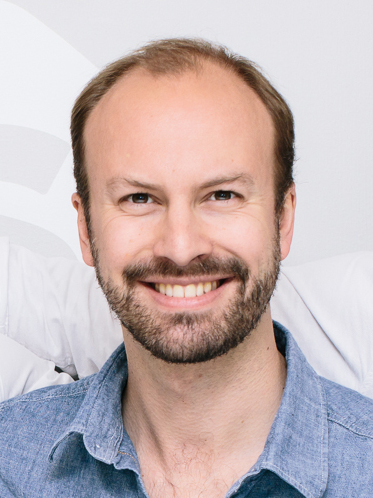
Persuasive Systems
How can we better steer the technologies designed to steer us?Abstract
As a consequence of the pandemic, we spend more time using digital technologies which are constantly evolving to persuade us in new, unexpected ways. But what does this persuasion entail and how does it work? This interdisciplinary discussion will explore the two-way interactional process of humans and persuasive digital technologies. It will touch upon the nature of this interaction, the persuasive systems that we predominantly engage with, the psychological effects of these systems, and ways for us to steer the technologies that are designed to steer us.
In this discussion, we will playfully explore the goals and intents of the cyborgs (cybernetic organisms), us humans have become. A cybernetic organism extends its physical and cognitive abilities in the world by integrating or interfacing with different technologies. The technologies we use, however, are never neutral but influences our thoughts and actions. They can thereby be considered persuasive systems. Persuasion, the act of intentionally influencing other people, is omnipresent in society. At work or home, in business, politics or academia, persuasion is not only unavoidable, but it is also a central part of interpersonal interaction. Everyone persuades and is persuaded all the time. The technologies which people use to persuade more effectively are constantly developing, creating new expected and unexpected ways to persuade. New forms of digital products and services lead to new forms of persuasion, which require new or modified design methods. Sometimes, the influence is bidirectional, and we now engage in mutual learning processes with machines, algorithms and computer programs.
As a consequence of the pandemic, we spend more time using digital technology. It begs the question: what happens when we expose our hearts and minds to the influence of persuasive systems? What persuasive systems do we engage with, which systems do we use to leverage our agency in the world? How can we better steer the technologies designed to steer us? These questions and many others will be explored with openness and curiosity at this interdisciplinary discussion.
Explorer

Gustav Borgefalk
Royal College of Art, United Kingdom
Gustav Borgefalk is a technologist and entrepreneur. He is a PhD candidate at the Royal College of Art (RCA) in London and his research investigates the design, ethics and governance of persuasive systems. Gustav is a guest lecturer in behavioural design and persuasive technologies at RCA and Imperial College. He has an MSc. degree in Business Administration from the Stockholm School of Economics and a diploma from Singularity University in Silicon Valley.
Co-Explorers

Dr Susanne Wigorts Yngvesson is Professor of Ethics at University College Stockholm. Her research has mainly focused on the ethical, philosophical and theological aspects of media ethics, surveillance, rights-oriented questions about the freedom of religion and conscience, but also AI technology. Her research also spans over theological analysis of hymns. From the outside, these subjects might seem widely separated, but the common denominator touches ethical and moral aspects.
Among other commitments, she is a member of the Swedish Police’s ethical advisory board, the initiator to the Surveillance & Religion Network at St Andrews University, St Mary’s College, and furthermore she’s behind the lyrics for some Swedish hymns.

Dr Claire Ingram Bogusz is a Senior Lecturer at the Department of Informatics and Media at Uppsala University, and is also affiliated with the House of Innovation at Stockholm School of Economics. She conducts empirical research into how code-based technologies (e.g. code itself, digital platforms, machine learning, AI, digital automation) are changing how we work, how organising occurs, and what these things mean for us as individuals and as members of increasingly unequal societies.
This lawyer-economist came to Sweden on a gap year, many years ago, intending to go back to South Africa and practice law. But serendipity intervened: she now conducts research in one of the most exciting–but accessible–IT entrepreneurship hotspots in the world.

Dr Stanley Greenstein is a Senior Lecturer (Assistant Professor) in Law and Information Technology (IT) at the Department of Law, Stockholm University and is a co-worker at the Swedish Law and Informatics Research Institute (IRI). Stanley’s main area of focus is the interaction between technology and law and how these two disciplines relate to each other. His teaching, research and practical participation in project work has centred on the topic of artificial intelligence (AI) and machine learning and its ethical and societal implications, of which privacy, data protection, information security and cyber security considerations are central.
A South African trained lawyer, Stanley has experience of working in a mixed legal jurisdiction made up of both the civil law and common law legal traditions.

Dr Harri Oinas-Kukkonen is Professor of Information Systems Science and Dean of Graduate School in the University of Oulu, Finland. His research has been published in a wide variety of computer science, human-computer interaction, information systems, business and management, and health and medical informatics journals. His main research interests include persuasive design, behavior change, digital interventions and humanized ICT. Oinas-Kukkonen has held different researcher positions at the Academy of Finland. He has also been a Nokia Visiting Fellow and visiting scholar at Stanford University, USA.
He has been listed among 100 most influential ICT experts in Finland and a key person to whom companies should talk to when developing their strategies for ICT services.

Host
Dr Ann Wong is a neuroscientist, specialised in hearing physiology and hearing loss. She carries out research internationally at top-ranked research institutes and universities in science and biomedicine such as UNSW Sydney, University of California San Diego, and the University of Auckland. Currently she is Senior Research Fellow at Taipei Medical University. In Stockholm she has worked at both Karolinska Institutet, Scilifelab, KTH Royal Institute of Technology, and House of Innovation at Stockholms School of Economics both as researcher, scientific writer and research and outreach manager.
About Stockholm Explorative Talks
Stockholm Explorative Talks is a meeting place for academic discussions confronting global problems with an interdisciplinary approach, by pairing unlikely academics together. Stockholm Explorative Talks welcomes experts from all over the world for a dialogue best described as dedicated, courageous and surprising. The aim is to gather the world’s brightest brains to examine current issues from new angles, and to find creative solutions to common future challenges.
In 2021, Stockholm Explorative Talks also brings to you a webinar series featuring a diverse group of academics and artists from around the world, from different disciplines for an unusual, interdisciplinary exchange of perspectives pertaining to a range of topical themes. In the course of this transaction of ideas, the webinar series will endeavor to encourage incisive questions, and locate the best ways to explore current issues.
Stockholm Explorative Talks is founded and run by Stockholms Akademiska Forum – 18 universities and the City of Stockholm.
